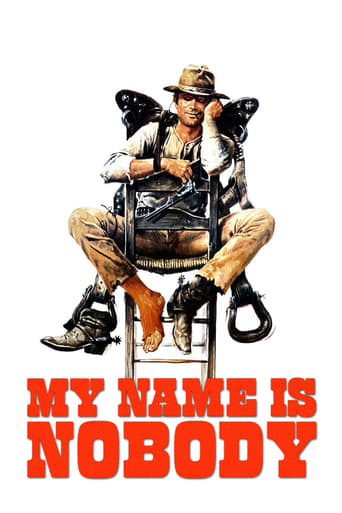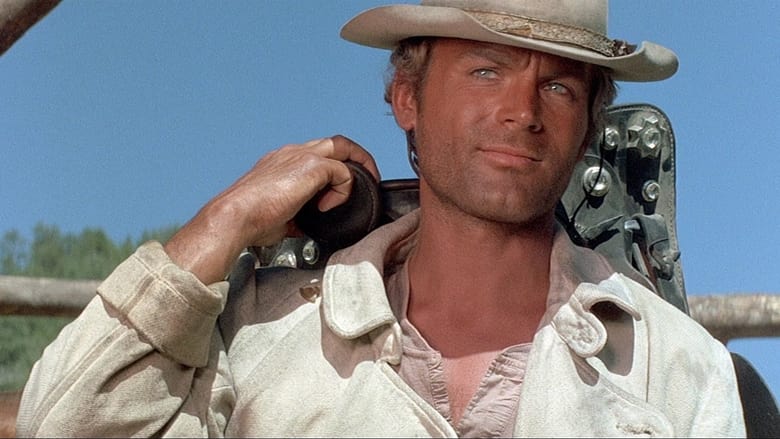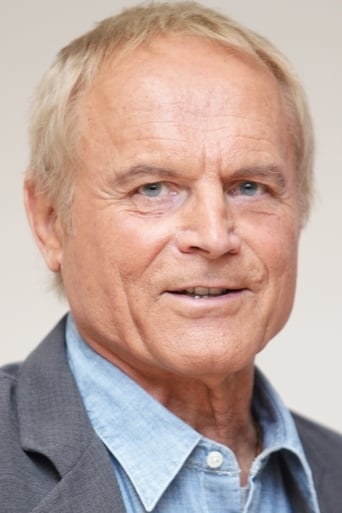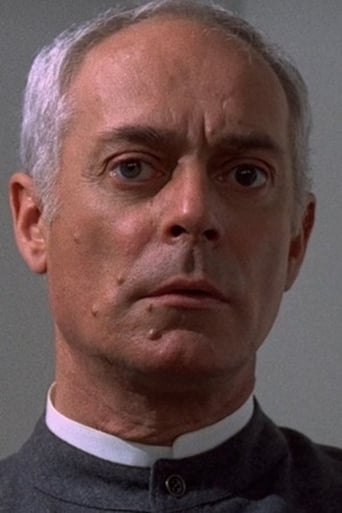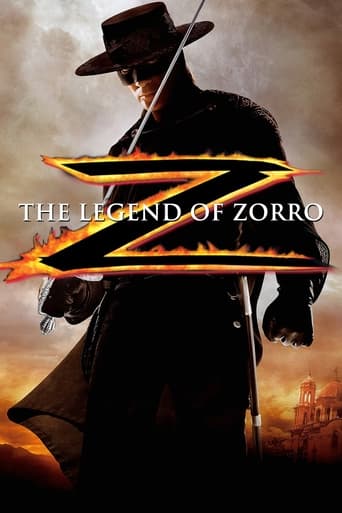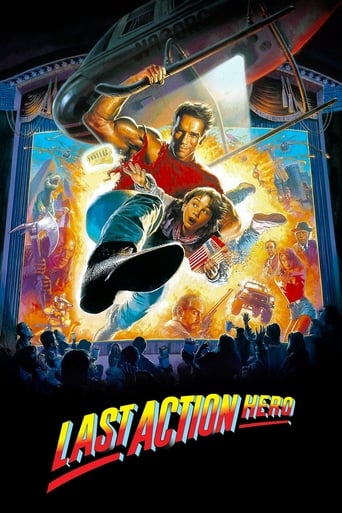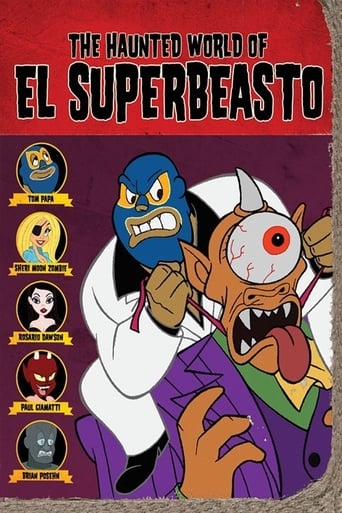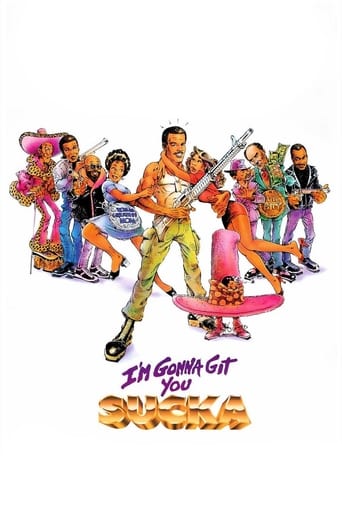My Name Is Nobody (1974)
Jack Beauregard, an ageing gunman of the Old West, only wants to retire in peace and move to Europe. But a young gunfighter, known as "Nobody", who idolizes Beauregard, wants him to go out in a blaze of glory. So he arranges for Jack to face the 150-man gang known as The Wild Bunch and earn his place in history.
Watch Trailer
Cast


Similar titles
Reviews
Absolutely Brilliant!
It's funny watching the elements come together in this complicated scam. On one hand, the set-up isn't quite as complex as it seems, but there's an easy sense of fun in every exchange.
Clever, believable, and super fun to watch. It totally has replay value.
As somebody who had not heard any of this before, it became a curious phenomenon to sit and watch a film and slowly have the realities begin to click into place.
By the 1970s, the Spaghetti Western had almost become a parody of itself as slapstick comedies within the genre has become more popular, than the serious drama-full violent westerns of the mid & late 1960s. Director Tonino Valerii & Producer Sergio Leone saw this and decide to capitalize by making their own subtle humor movie. That movie would become, 'My Name is Nobody'; a title that alludes to the reply, Odysseus gave Polyphemus the Cyclops when asked his name in the Greek myth, Homer's Odyssey. Like Homer's tale, this film that tells the story of a mysterious nobody (Terrence Hill), trying to become somebody; by helping his child-hood hero, Jack Beauregard (Henry Fonda) fight against the legendary Wild Bunch gang. Outgunned and outnumber, the two of them, must find a way to become legendary. Can mysterious stranger's plan work or will both of them, fade away from the hands of time? Watch the movie to find out! Without spoiling the movie, too much, I have to say, I love, how the film uses the dramatic sounds of a ticking of a clock to show, how little time, there is, for the unnamed person to make a name for himself. Some of the best suspense is in the opening scene at the barber shop. That opening set piece is masterful. I love that dose of intensity, so abstract, economical, and well deliberately paced. However, the movie starts to fall downhill, when the comedy kicks in, after that. It's there, that movie's message gets kinda lost, because of the large amount of slapstick filler and goofy ass music. Ennio Morricone's choice of mixing the whimsical tones of his older films, with that of different music styles such as Richard Wagner's Ride of the Valkyries or Paul Anka's My Way was kinda annoying. The opening song alone, sounds like it comes from a kid's beatbox with sounds of boiling hot water added to it. When the music and tone veers from serious suspense to goofball comedy in one second. Then, you know you got a problem. It wasn't well paced. The film wobbles from set-piece to set-piece with little time for exposition or establishing structure. It was very underdeveloped. Scenes from that moment, until the end, felt a bit choppy & uneven. Lots of continuity & factual errors start to pop up. It doesn't help that the film is full of anachronisms as well. There were even scenes where a lot of nothing, going on. Even the dialogue in the film seem a little drawn out. Still, the acting in the film wasn't that bad. It was pretty alright in my eyes. While, Henry Fonda seem particularly out of it, due to health problems, he still has the acting chops to pull the rough & tough cowboy role off. Terrence Hill in the other hand, was hilarious and likable, but his character was a little too similar to the one character from his 1970's ¨They call me trinity¨ and 1971's ¨Trinity is still my name¨ days. I was really confused, on how serious, we supposed to take his character. He's seem to be, a little too cartoony to be a realistic character. Another thing, that bother me, was the how the film is full of unrealistic childish violence mixed with real world violence. It's weird, how some dynamite explodes kills people, and other moments, it doesn't. The gunfights are really odd looking with the speed up and slow motions. It doesn't fit, well with the rest of the film. The humor is a mixed bag for me, as well. I like the shooting of glasses contest, but I think other examples of humor such as the urinal scene were rather tasteless. However, I did like the inside jokes and film references, the filmmakers put into the film. It's nice to see homages to 1947's The Lady from Shanghai, 1928's the Circus, 1968's Wild Bunch & others. Although the movie is mostly well-shot. It's really hard to figure out, which director help shot, what. Leone, himself, says that help directed a few scenes, such like the opening scene, the graveyard scene, Wild Bunch scene, and the duel in New Orleans. It's here, that fans will recognize the use of close-ups, depth of field, odd sounds, and long stretches of men staring at each other and making the audience uncomfortable. However, its rumor that, he had might have done the mirror, the urinal scene and part of the shooting of the beer glasses, which weren't so good, but in my opinion, I really don't think, he did any of the comedy scenes, himself. In the end, it doesn't really matter, because the movie is great to look at. The exotic locations pick for this film are well-used. Each one of them, representing a part of the Western film history. The graveyard scene, filmed at Acoma Puebla in New Mexico is known as a common film shooting grounds for American Westerns movies. The desert of La Calahorra in Spain, is known as the homeland of the spaghetti westerns. Last the scene in New Orleans, represented, where Fonda and Hill's character collide, represented the moment where the movie would metaphorically kill, the original format in which the western genre has been done, and reshape the four types of westerns: the classic Hollywood western, the classic Italian western, the revisionist Hollywood western and the Italian comedy western into their own image. . It reflects the development and degeneration of the genre. It's basically, telling, how to make something old, seem new, again. This movie would go on to have sequel, titled, 'A Genius, Two Partners and a Dupe' also called, 'Nobody's the Greatest' in 1975, which also wasn't that good. Overall: Two things go straight through a man's heart. Bullets and gold. This movie had that, but it was also way too campy. A 7/10.
This is a wonderfully whimsical Western that delightfully blends poignant drama with broad & silly comedy. Based on an idea by Spaghetti Western master Sergio Leone (who was also an uncredited executive producer), it stars "They Call Me Trinity" lead Terence Hill as an easygoing and ambitious young gunman, the "Nobody" of the title. He absolutely worships aged former gunfighter Jack Beauregard (Henry Fonda), who would prefer to retire in peace, but Nobody is determined that Beauregard make history one last time. Therefore, Nobody sees to it that Beauregard will face off against a 150-man gang known as The Wild Bunch.As one can see, Leone and company, including screenwriter Ernesto Gastaldi and director Tonino Valerii, have great affection for Sam Peckinpah and his signature film. They have a substantial amount of fun adding the comedy to the mix, coming up with some ingenious gags and images, especially when Nobody is eliminating gunmen inside a house of mirrors. "My Name is Nobody" does go on a little longer than really necessary, with a protracted scene of Nobody proving his prowess in a shooting / drinking contest. But the balance of the picture is just so disarming that it's easy to look past this and appreciate the earnestness and passion in this story.Hill displays quite a bit of natural charm, while Fonda knows he's got a good part and relishes his various conversations with his younger co-star. Familiar actors in the supporting cast include not only people like Piero Lulli, Mario Brega, and Antoine Saint-John, but very fine American character players like R.G. Armstrong, Leo Gordon, Steve Kanaly, and Geoffrey Lewis. The milieu is very much male dominated, with female faces few and far between.Ennio Morricone obviously enjoyed himself spoofing his earlier scores, coming up with some amusing silliness, especially as he incorporates "Ride of the Valkyries". However, he still creates some wonderful moments with the more serious portions of his soundtrack.The script has an appealing cyclical quality, certain to send viewers away with a great deal of satisfaction.Eight out of 10.
I think of this movie in thirds. The first third and last third of this movie are fine. The middle third is where it gets bogged down, especially with slapstick scenes that are out of place and gratuitous. Don't blame Terrence Hill or Henry Fonda, they defined the roles and played them well. In fact, all of Hill's slapstick scenes were well played, it's just that most of them didn't belong in this type of movie, which was NOT, strictly speaking, a comedy, nor was it supposed to be one. Reading the other reviews, it seems that it was supposed to be a parody of the spaghetti western genre. This was probably a mistake. Anyway, for it to be successful, it had to stand out on its own which it failed to do. This movie could have been a good one if it took itself more seriously. Unfortunately, the plot was not fully developed with regards to Fonda's character and the mine, it was just hastily explained. This occurred along with the majority of slapstick scenes in the middle of the movie. The saloon scene was not believable. I don't think much of scenes where a character can drink massive amounts of hard liquor and still function okay. Sorry, not humanly possible. The fun house scene was just stupid and unnecessary. Hill and Fonda prevail, but really, gunfights in the dark? Think about it. There was the outdoor urinal scene with Hill and the train conductor, but this was not slapstick, it was your typical spaghetti western situation with a brief comedic moment and a resolution. It was well acted by both Hill and the train conductor. If you like the genre, this movie is still worth watching. It is too bad that Sergio Leone didn't take total control and treat this as another true spaghetti western with some additional parody elements. The script is fairly original, after all. In addition to weak plot development, the trademark Leone attention to detail was lacking. Why was Fonda wearing such a shabby coat? Fonda was believable in his role, but didn't look as imposing as in his previous role in Once Upon a Time in the West. I found out he was about 67 when he was in this movie! He looked really good for 67, the least they could have done was give him a better western wardrobe. In the part of the movie that shows the ship's sailors, I wondered if they were in San Francisco, instead of New Orleans. Does New Orleans ever get so cold that you see people wear sweaters and wool caps? Even the great Ennio Morricone was off in this one. The wild bunch theme music starts off great, then degenerates when Ennio inserts music from Wagner played on what sounds like a kid's toy harmonica? Also bad were the "sped up" slapstick scenes. They did Hill no amount of justice and would have been lame even if the movie was a true comedy. Still, it is worth watching for how Hill and Fonda played their characters and wondering what "could have been".
The story goes that Sergio Leone felt like he had to top the Italian box office earnings of "They Call Me Trinity" so he came up with the idea for "My Name is Nobody." This lavish international production is a comedy about hero worship and a commentary about American westerns as much as it constitutes a comment about Spaghetti westerns. By the 1970s the Europeans had exhausted the western. According to Sir Christopher Frayling, the Spaghetti western had run its course and had slipped into self-parody, and "My Name is Nobody" exemplified the changing fortunes of the genre. If Clint Eastwood represented the serious, cynical Italian westerns as an iconic hero, then Terence Hill epitomized the low-brow, comedic Euro western hero. Indeed, Leone appropriates some of the things that made Nobody reminiscent of Trinity. Terence Hill drew his six-gun with blinding speed, and he wore his charisma on his sleeve. He was an extremely likable lad and you have to admire the lengths that his anonymous gunslinger went to so that he could immortalize his idol Jack Beauregard (Henry Fonda), a legendary gunslinger in his own right. Earlier, Fonda had played a cast-iron villain in Leone's undisputed masterpiece "Once Upon a Time in the West," but here he plays a good guy who is deadly swift on the draw. The problem is Jack is growing old and his sight is beginning to suffer. If any actor other than John Wayne represented the essence of the American western, it would have to be Henry Fonda. Fonda has starred in his share of classic oaters, among them "Fort Apache," "The Oxbow Incident," and "Warlock." When he starred in Leone's "Once Upon a Time in the West," he played a villain as he would in a James Stewart western "Firecreek." This movie is essentially the crossroads of two genres: the traditional American western crosses trails with the revisionist European western, and this distinguishes "My Name is Nobody." It should come as no surprise that parts of "Nobody," like "Once Upon a Time" were lensed in American and a large part of the cast is American. Although it is uneven and "Day of Anger" director Tonino Valerii lacks Leone's operatic staging qualities, "My Name is Nobody" still emerges as a worthwhile western. Incidentally, Sergio Corbucci had used the idea as early as 1964 about a gunfighter with ailing eyesight in in "Minnesota Clay." Anyway, Valerii worked with Leone, and he knew how to stage a scene and make it look good, but he doesn't have the gimlet eye that Leone possessed. Moreover, Leone's westerns and his crime movies are realistic, cynical, and mean-spirited. "My Name is Nobody" is more comic. For example, for sheer hilarity examine the wonderful whiskey glass shooting scene in the bar. Valerii does an exceptional job with it. The opening shoot-out in the barber shop is textbook Leone. The wide angle shot where you see Fonda shoot three men is spectacular. Reportedly, Leone is said to have staged it. Ennio Morricone provides a beautiful score, and the familiar western theme of an older man teaching a younger man is reversed here in classic style. Unlike the Henry Fonda/Tony Perkins' western "The Tin Star," where the older man saved the younger man, Nobody saves Jack Beauregard. Most Spaghetti western spoofs, like the "Trinity" movies were essentially hillbilly westerns with good jokes, "My Name is Nobody" is a comedy, but it has something serious to say. The dialogue is occasionally distinctive: "Two things go straight to a man's heart: bullets and gold." Leone and Vallerii scare up some veteran American character actors, including R.G. Armstrong, Leo Gordon, and Geoffrey Lewis. Sometimes, a scene or two will wear out its welcome, but considering the epic nature and the cinematic referencing, "My Name is Nobody" is a must-see for Spaghetti western fans and western movie fans in general.

